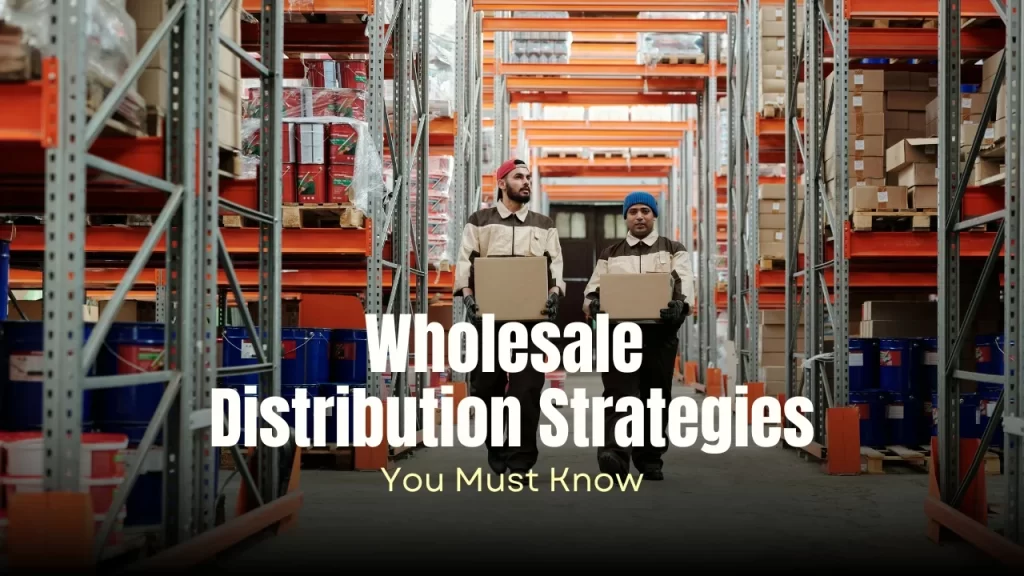In the dynamic world of commerce, Wholesale Distribution plays a pivotal role in bridging the gap between manufacturers and retailers. Whether you’re launching a new venture or scaling an existing operation, understanding this distribution model can help unlock new growth opportunities. This blog explores the meaning of wholesale distribution, its key benefits, expert tips for success, and how it fits within broader supply chain management strategies.
Products for Wholesale Distributors
What is Wholesale Distribution?
Wholesale Distribution refers to the process of buying products in bulk from manufacturers and reselling them to retailers, commercial institutions, or even other distributors. Unlike retail, which focuses on selling directly to end consumers, wholesalers act as middlemen who streamline product availability across markets.
This model offers a cost-effective way to move goods from producers to sellers while optimizing inventory and logistics. Wholesale distributors often operate in warehouses and distribution centers and rely heavily on robust supply chain management and distribution channel strategy to deliver value.
The Wholesale Business Model Explained
The Wholesale Business Model functions on volume. Distributors purchase products at a lower cost due to bulk buying and make a profit by selling those goods at a markup. This model reduces marketing and customer service overheads compared to retail, making it a more operationally focused business.
There are three main types of wholesale distributors:
- Merchant Wholesalers: Buy, store, and sell products.
- Brokers and Agents: Facilitate deals between buyers and sellers.
- Manufacturers’ Sales Branches: Operated by manufacturers to distribute their own products.
╰┈➤ Smart Bulk Buying Strategies for Long-Term Savings
Key elements of the Wholesale Business Model include:
- Bulk purchasing and storage
- Price negotiation with manufacturers
- Order fulfillment and delivery
- Strategic partnerships with retailers
Key Benefits of Wholesale Distribution
1. Economies of Scale
Wholesale distributors benefit from buying in bulk, which reduces per-unit costs and increases margins. Retailers also gain access to competitively priced products.
╰┈➤ Bulk Buying Mistakes in Businesses | How to Avoid Them?
2. Streamlined Logistics
By handling procurement, storage, and delivery, wholesale distributors simplify the retail distribution process, reducing friction for retailers.
3. Scalability
As demand grows, distributors can easily expand their operations by leveraging efficient supply chain management systems and expanding their distribution channel strategy.
4. Market Reach
With the right partners, wholesalers can distribute products across various regions and sectors, helping brands scale their presence.
5. Risk Management
Distributors manage inventory and supply risks, buffering both manufacturers and retailers from stockouts or overproduction.
Understanding the Retail Distribution Process
The Retail Distribution Process involves multiple stages from wholesaler to retailer to consumer. A successful process relies on:
- Inventory planning and control
- Efficient order fulfillment
- Timely delivery and logistics coordination
- Communication across supply partners
Wholesale distributors are key players in this chain, acting as logistical and financial intermediaries. They must constantly adapt to market demands and streamline their internal operations to stay competitive.
╰┈➤ Top B2B Products to Stock Right Now
Trends Shaping the Wholesale Market
The wholesale market trends are rapidly evolving with the integration of technology and shifting customer expectations. Here are some notable trends:
1. Digitization and Automation
ERP systems and AI-based inventory tracking are revolutionizing wholesale operations. Tools that automate procurement, forecasting, and fulfillment improve efficiency.
2. E-Commerce Integration
Wholesale distributors are now establishing B2B e-commerce platforms to simplify ordering and improve client experiences. This aligns with current wholesale market trends focused on digital transformation.
3. Sustainable Practices
Environmental and ethical considerations are influencing buying decisions. Distributors must now consider eco-friendly sourcing and packaging.
4. Demand for Customization
Retailers expect tailored products, faster shipping, and flexibility. Wholesale distributors are adjusting to deliver a more retail-like experience.
Distribution Channel Strategy: Building the Right Framework
A strong distribution channel strategy defines how a product moves from manufacturer to end user. It encompasses:
- Direct Distribution: Manufacturer sells directly to retailers or consumers.
- Indirect Distribution: Use of wholesalers and intermediaries.
- Hybrid Channels: Combination of both.
An effective distribution channel strategy for wholesale distribution ensures:
- Efficient logistics and storage
- Strategic partnerships with retailers
- Market segmentation and targeted reach
- Minimal stock wastage and optimized returns
Wholesale distributors must continually evaluate their distribution channel strategy to align with changing wholesale market trends and consumer behavior.
Supply Chain Management for Distributors
Supply Chain Management in wholesale distribution involves overseeing the entire flow of goods, information, and finances from supplier to customer. Key components include:
- Procurement: Sourcing products from manufacturers
- Warehousing: Managing inventory levels and storage
- Logistics: Transporting goods to retailers efficiently
- Technology: Using data and software to forecast demand and track performance
For distributors, strong supply chain management enhances agility and customer satisfaction while reducing costs and delays.
Expert Tips for Succeeding in Wholesale Distribution
1. Invest in Technology
Leverage software tools for inventory management, customer relationship management (CRM), and enterprise resource planning (ERP). These tools help automate tasks and enhance decision-making.
2. Build Strong Relationships
Long-term partnerships with manufacturers and retailers lead to better pricing, product access, and trust. A reliable network can also buffer against market volatility.
3. Focus on Niche Markets
Rather than distributing a wide array of generic products, consider specializing in a niche—such as MLM products under a brand like TopNet Distributors—to differentiate your offerings and build brand equity.
4. Stay Updated on Wholesale Market Trends
Attend industry expos, follow trade publications, and join B2B platforms to keep tabs on innovations and shifting demand patterns.
5. Optimize Your Distribution Channel Strategy
Evaluate performance metrics like delivery times, order accuracy, and cost-to-serve. Refine your channel mix accordingly.
6. Master the Retail Distribution Process
Understand how your retail partners operate so you can better support them with timely deliveries, marketing collateral, and flexible ordering terms.
Case Example: TopNet Distributors – A Leader in MLM Wholesale
TopNet Distributors is a fast-growing wholesaler of health and wellness MLM products. Their success is rooted in three key factors:
- Targeted Distribution Channel Strategy: They use hybrid channels to serve both traditional retailers and online sellers.
- Advanced Supply Chain Management: Automated warehousing and predictive analytics help optimize stock levels.
- Adaptation to Wholesale Market Trends: They’ve adopted sustainable packaging and digital platforms for order management.
By focusing on a strong wholesale business model, TopNet has scaled its operations across Asia while supporting its MLM network effectively.
Challenges in Wholesale Distribution
While the benefits are numerous, wholesale distribution also comes with challenges:
- Thin Margins: Profitability relies on volume; any disruptions can hurt revenue.
- Inventory Risks: Overstocking or understocking can lead to losses.
- Complex Logistics: Coordinating shipments and deliveries can be operationally intensive.
- Market Competition: Globalization and digitalization have intensified competition.
- Regulatory Compliance: Import/export laws, taxes, and product regulations can complicate operations.
By proactively addressing these issues through smart planning and technology integration, wholesalers can stay ahead.
FAQs: Wholesale Distribution
1. What is the difference between wholesale and retail distribution?
Wholesale involves selling products in bulk to businesses, while retail targets individual consumers. Wholesale distribution focuses on volume and supply chain efficiency, while retail emphasizes customer experience and marketing.
2. How can I start a wholesale business?
To start, choose a niche, find reliable suppliers, set up a warehouse or fulfillment process, and develop your distribution channel strategy. Investing in technology and building relationships with retailers is also crucial.
3. What are the key components of the wholesale business model?
The Wholesale Business Model includes bulk purchasing, warehousing, logistics, B2B marketing, and order fulfillment. Profit is made by selling goods at a markup to retailers or commercial clients.
4. How do I adapt to changing wholesale market trends?
Stay informed through industry reports, trade shows, and competitor analysis. Incorporate technology, adopt sustainability practices, and consider shifting to digital B2B platforms.
5. Why is supply chain management important for wholesalers?
Efficient supply chain management reduces delays, prevents stock issues, improves customer satisfaction, and increases profitability. It forms the backbone of a successful wholesale operation.
6. What is the role of a distribution channel strategy in wholesale?
A solid distribution channel strategy determines how products reach the market. It helps maximize coverage, reduce costs, and meet customer expectations efficiently.
In the fast-evolving commercial landscape, wholesale distribution remains a critical component of global trade. Whether you’re a startup venturing into bulk sales or an established distributor refining your wholesale business model, success hinges on understanding logistics, market demands, and building resilient partnerships.
By staying ahead of wholesale market trends, leveraging a strong distribution channel strategy, and mastering the retail distribution process, wholesalers can not only thrive but also lead the transformation of modern trade. For those distributing MLM and specialty products, brands like TopNet Distributors offer a roadmap to scalable success rooted in innovation and adaptability.










